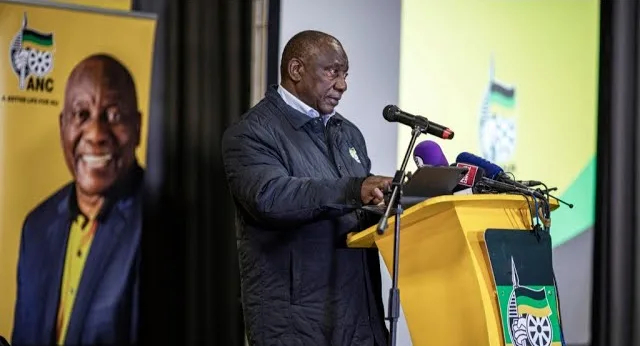The ANC, having lost its majority, reaches a broad agreement with opposition parties ahead of the parliamentary vote to reelect President Cyril Ramaphosa
South Africa’s African National Congress (ANC) announced on Thursday that it has reached a broad agreement with the main opposition, the Democratic Alliance (DA), and several other parties to form a coalition government. This development comes after the ANC lost its 30-year parliamentary majority in the election held on May 29.
The announcement was made by ANC Secretary-General Fikile Mbalula following a leadership meeting in Cape Town, which included President Cyril Ramaphosa. The agreement aims to end the political deadlock and ensure Ramaphosa’s reelection for a second term, with the first sitting of the new Parliament set to take place on Friday.
“We have reached a major breakthrough that the majority of political parties in our country have agreed to work together,” Mbalula said. However, he noted that the finer details of the agreement still need to be finalized. Talks will continue to iron out the specifics of how the coalition will operate and share power.
The ANC lost its long-held majority in the recent election, securing only 40% of the vote, while the DA garnered 21%. Together, these parties would hold a clear majority in Parliament, enabling them to govern and reelect Ramaphosa, provided they finalize their coalition agreement.
The ANC’s move to form a coalition government marks a historic shift in South African politics. Since the end of apartheid in 1994, the ANC has governed without needing to form coalitions at the national level. This election outcome signifies the first time South Africa will have a coalition government at the national level in its three decades as a democracy.
Mbalula highlighted that discussions were held with all 17 other parties represented in Parliament, inviting them to join the unity government. Some smaller parties, such as the Inkatha Freedom Party, have already agreed to participate. However, notable parties like the Economic Freedom Fighters and the MK Party, led by former President Jacob Zuma, have refused to join the coalition and criticized the unity government plan.
The agreement comes just in time, as South Africa’s constitution mandates that Parliament must convene and elect a president within 14 days of the official declaration of election results. The new Parliament’s first sitting is scheduled for Friday, with the deadline looming on Sunday.
The election of the president, Parliament’s new speaker, and deputy speaker will be among the critical votes influenced by the newly formed coalition. The ANC’s broad agreement with other parties is expected to secure the necessary support for these pivotal roles.
Analysis:
Political: The formation of a coalition government signals a significant shift in South Africa’s political landscape. The ANC’s need to collaborate with the DA and other parties reflects a departure from its longstanding dominance. This coalition could bring diverse perspectives into governance but may also face challenges in maintaining unity and coherence in policy-making.
Social: The coalition government could lead to a more inclusive political environment, representing a broader spectrum of South African society. This inclusivity might foster greater public engagement and trust in the political process, although it also raises questions about the stability and effectiveness of the coalition.
Racial: South Africa’s political dynamics are deeply intertwined with its racial history. The coalition government may need to address racial disparities more collaboratively, considering the diverse voter base and representatives within the coalition. This could lead to more comprehensive policies aimed at bridging racial divides.
Gender: The coalition talks and the resultant government formation could impact gender representation in Parliament and executive roles. The involvement of multiple parties might lead to a more balanced gender representation, reflecting a commitment to gender equality in political leadership.
Economical: The coalition government will need to address South Africa’s economic challenges, including unemployment, inequality, and economic growth. A multi-party government might bring varied economic policies and approaches, potentially fostering innovative solutions but also posing risks of policy disagreements and delays.
